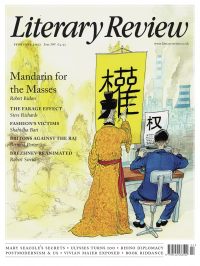Steven Nadler
Strife on Earth
Dark Matters: Pessimism and the Problem of Suffering
By Mara van der Lugt
Princeton University Press 450pp £28
Philosophy in the early modern period sometimes does not seem so modern. True, much of what now constitutes epistemology and philosophy of mind was initiated by René Descartes. He and his 17th-century colleagues Thomas Hobbes, Pierre Gassendi, Baruch Spinoza, Robert Boyle, John Locke, Nicolas Malebranche, Gottfried Wilhelm Leibniz and others, like Galileo shortly before them, all defended one version or another of the mechanistic philosophy of nature, the forerunner of contemporary physics. Yet the foundation of Descartes’s epistemology is a benevolent, non-deceiving God who guarantees the reliability of our rational faculties. Malebranche and Leibniz also appealed to God, in Malebranche’s case to provide a causal explanation for the dynamic behaviour of bodies, and in both cases to account for the ordinary correlation between mental states and bodily states in a human being. Perhaps most remarkable of all, quite a few of the ‘moderns’, like their medieval forebears, went to a great deal of trouble to rationally accommodate within their metaphysics such an important dogma of the Catholic faith as the ‘real presence’ of Christ in the Eucharistic host.
If there is one philosophical topic that qualified as ‘the hard problem’ in the 17th and 18th centuries,

Sign Up to our newsletter
Receive free articles, highlights from the archive, news, details of prizes, and much more.@Lit_Review
Follow Literary Review on Twitter
Twitter Feed
It wasn’t until 1825 that Pepys’s diary became available for the first time. How it was eventually decrypted and published is a story of subterfuge and duplicity.
Kate Loveman tells the tale.
Kate Loveman - Publishing Pepys
Kate Loveman: Publishing Pepys
literaryreview.co.uk
Arthur Christopher Benson was a pillar of the Edwardian establishment. He was supremely well connected. As his newly published diaries reveal, he was also riotously indiscreet.
Piers Brendon compares Benson’s journals to others from the 20th century.
Piers Brendon - Land of Dopes & Tories
Piers Brendon: Land of Dopes & Tories - The Benson Diaries: Selections from the Diary of Arthur Christopher Benson by Eamon Duffy & Ronald Hyam (edd)
literaryreview.co.uk
Of the siblings Gwen and Augustus John, it is Augustus who has commanded most attention from collectors and connoisseurs.
Was he really the finer artist, asks Tanya Harrod, or is it time Gwen emerged from her brother’s shadow?
Tanya Harrod - Cut from the Same Canvas
Tanya Harrod: Cut from the Same Canvas - Artists, Siblings, Visionaries: The Lives and Loves of Gwen and Augustus John by Judith Mackrell
literaryreview.co.uk